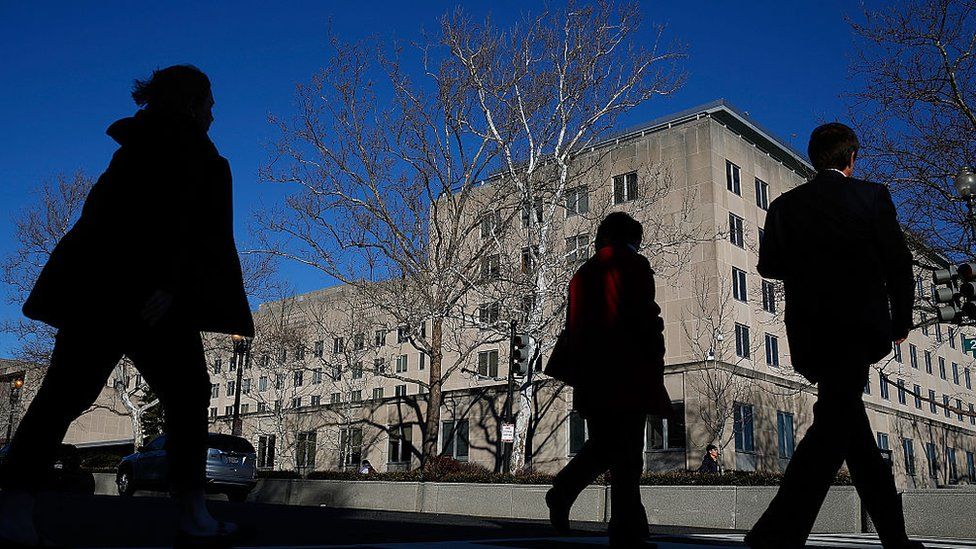US diplomacy cuts 'decapitates' State Department leadership
- Published

US State Department cuts have led to a "decapitation" of senior leadership, the head of the labour union that represents US diplomats has said.
"Leadership ranks are being depleted at a dizzying speed," Barbara Stephenson, head of the American Foreign Service Association (AFSA), wrote in a letter.
Ms Stephenson, a former ambassador to Panama, says the cuts have been concentrated at "our very top ranks".
The Department of State told the BBC the freeze on promotions is temporary.
"The rapid loss of so many senior officers has a serious, immediate, and tangible effect on the capacity of the United States to shape world events," Ms Stephenson wrote.
The former ambassador to Panama wrote in a forthcoming issue of the Foreign Service Journal that the art of diplomacy must be defended under an administration that she argues appears bent on "dismantling government as we know it".
Ms Stephenson wrote that the US lost 60% of US career ambassadors since January, but clarified in an interview with the Public Broadcasting Service (PBS) on Wednesday that the drop was from five career - or four star- ambassadors to two.
The State Department tells the BBC that US Secretary Rex Tillerson plans "to nominate individuals for this role in the near future".
She added that promotions for senior ranks just below career ambassadors had also fallen, which "has the effect of thinning the ranks of the senior leadership".
The decline of US diplomacy?
Analysis by Barbara Plett Usher, State Department correspondent, BBC News
This letter is the latest cry of distress from diplomatic veterans warning about the "mounting threats" to the State Department.
They say that the exodus of disillusioned top career officers is depriving the institution of decades of diplomatic experience.
And that the freeze on lower level hiring will weaken it in the future. Then there is the slow pace of political appointments to crucial jobs.
That has picked up lately but it's been hindered by the small pool of qualified personnel: President Trump refuses anyone who opposed his candidacy, and most of the Republican foreign policy establishment did.
Mr Tillerson is in the midst of reorganising and streamlining the department. Previously he's rejected claims that a staffing crisis is affecting the institution, listing the many international issues on which he's working and naming the career diplomats on whom he relies for help.
All of which leaves Ms Stephenson to wonder darkly about who's behind the alleged impetus to "weaken the American Foreign Service."
As well as envoys, the staff numbers of other high-ranking diplomatic ministers have fallen, reports the organisation, which was founded in 1924.
Mrs Stephenson writes that the decisions by career diplomats (who, unlike political appointees, do not change with every White House administration) were fuelled in part by the government's decision to "slash promotion numbers by more than half".
The Department of State told the BBC the freezes on hiring and promotions "are only temporary while we study how to refine our organisation".
A hiring freeze has also led to a drop in entry level staffers joining the US agency tasked with worldwide diplomacy.
"The talent being shown the door now is not only our top talent, but also talent that cannot be replicated overnight," Mrs Stephenson writes.
She adds that if such an exodus were to occur within military ranks, "I would expect a public outcry".
Mrs Stephenson also points to Congress' opposition to such drastic cuts to the department, saying the Senate has labelled doing so "a doctrine of retreat".
In her scathing editorial, she questions "Why such a focus on decapitating leadership? How do these actions serve the stated agenda of making the State Department stronger?
"Where is the mandate to pull the Foreign Service team from the field and forfeit the game to our adversaries?"
Former Secretary of State Madeleine Albright - who was a staunch supporter of Hillary Clinton - told MSBNC on Wednesday that she is "deeply, deeply troubled" by the lack of staffing, "because you cannot be a major power in the world and not have a functioning diplomatic service".
A year after President Donald Trump's election, there are no nominees for scores of unfilled senior posts at the Department of State, according to the tracker by the Washington Post and Partnership for Public Service.
Last week Mr Trump was asked about the vacancies at the US foreign affairs ministry.
"I'm the only one that matters," he replied.
- Published4 August 2017
- Published29 March 2017
- Published20 September 2017
- Published20 June 2017